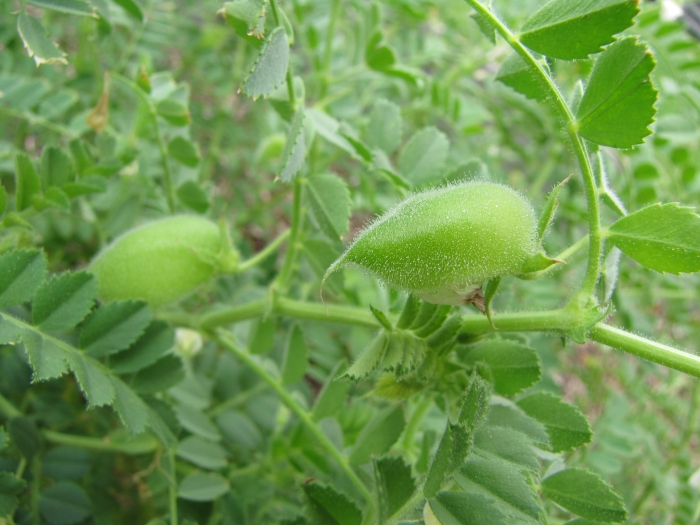Chickpea
(Cicer arietinum)
Chickpea (Cicer arietinum)
/
/

Forest and Kim Starr
CC BY 2.0
Image By:
Forest and Kim Starr
Recorded By:
Copyright:
CC BY 2.0
Copyright Notice:
Photo by: Forest and Kim Starr | License Type: CC BY 2.0 | License URL: https://creativecommons.org/licenses/by-sa/2.0/ | Uploader: Starr Environmental | Publisher: Flickr |









































Estimated Native Range
Summary
Cicer arietinum, commonly known as Chickpea or Garbanzo bean, is an annual herbaceous plant native to the Caucasus region and Western Asia. As one of the earliest cultivated legumes, it has been grown for thousands of years for its high-protein seeds. The plant typically grows to a height of 20–50 cm (8–20 in) and features small, feathery, compound leaves on either side of the stem. Chickpeas produce distinctive flowers that are usually white or cream-colored with blue, violet, or pink veins, blooming in the late spring to early summer. The flowers are not particularly showy, but they give way to seedpods, each containing two to three edible peas.
Chickpeas are valued in cultivation for their nutrient-rich seeds, which are a staple in many global cuisines. They are commonly used in culinary applications, including soups, stews, and salads, and are the main ingredient in hummus and falafel. In the garden, they can be grown for both their edible seeds and as a cover crop to fix nitrogen in the soil, improving its fertility. Chickpeas prefer full sun exposure and are drought-tolerant once established, requiring low to medium amounts of water. They thrive in well-drained soils and are generally easy to maintain. However, they can be susceptible to fungal diseases, particularly in humid climates. Rotating crops and ensuring good air circulation can help prevent these issues.CC BY-SA 4.0
Chickpeas are valued in cultivation for their nutrient-rich seeds, which are a staple in many global cuisines. They are commonly used in culinary applications, including soups, stews, and salads, and are the main ingredient in hummus and falafel. In the garden, they can be grown for both their edible seeds and as a cover crop to fix nitrogen in the soil, improving its fertility. Chickpeas prefer full sun exposure and are drought-tolerant once established, requiring low to medium amounts of water. They thrive in well-drained soils and are generally easy to maintain. However, they can be susceptible to fungal diseases, particularly in humid climates. Rotating crops and ensuring good air circulation can help prevent these issues.CC BY-SA 4.0
Plant Description
- Plant Type: Herb
- Height: 0.8-2 feet
- Width: 0.5-0.3 feet
- Growth Rate: Moderate
- Flower Color: White, Blue, Purple, Pink
- Flowering Season: Summer
- Leaf Retention:
Growth Requirements
- Sun: Full Sun
- Water: Medium
- Drainage: Medium
Common Uses
Drought Tolerant, Edible*Disclaimer: Easyscape's listed plant edibility is for informational use. Always verify the safety and proper identification of any plant before consumption., Low Maintenance
Other Names
Common Names: Bengal Gram, Chickpea, Garbanzo Bean, Garbanzo, Egyptian Pea, Bengal Gram, Gram, Goyun Nokhud, Kichererbse, Kirchererbse
Scientific Names: , Cicer arietinum, Cicer arientinum, Cicer arietinum var. nigrum, Cicer arietinum var. fuscum, Cicer arietinum subsp. arietinum, Ononis crotalarioides, Cicer arietinum var. cruentum, Cicer arietinum var. album, Cicer edessanum
GBIF Accepted Name: Cicer arietinum L.